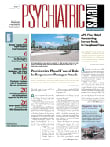The federal government is hoping to streamline and standardize informed consent and reporting requirements for research involving humans and to tailor administrative requirements for reporting to the level of risk involved in different studies.
The Department of Health and Human Services (HHS) has issued an "advance notice of proposed rule making" that would make sweeping changes to the regulations for research involving human subjects that were formulated in the 1970s and 1980s and implemented in the early 1990s.
These regulations, which govern risk assessment and informed consent in human research, became accepted by multiple federal agencies that oversee research and were codified as the "Common Rule."
The advance notice was posted in the Federal Register on July 25 and appears under the title "Human Subjects Research Protections: Enhancing Protections for Research Subjects and Reducing Burden, Delay, and Ambiguity for Investigators." The advance notice permits HHS to get public and professional feedback before formally putting forward its proposal.
For instance, in the time since the Common Rule was established, multisite trials have become more common. But under the Common Rule, every institution participating in the trial must establish a separate Institutional Review Board (IRB) to approve the research—a cumbersome requirement that has greatly increased the cost and administrative burden associated with multisite trials.
But under the new rules proposed by HHS, a multisite trial would require only one IRB of record.
Darrel Regier, M.D., M.P.H., head of APA's Division of Research, told Psychiatric News that the proposed changes are welcome. "Our DSM-5 field trials have 11 different participating sites," he said. "We would have liked to have something like this change in place when we got started."
Robert Charrow, an attorney who serves on the IRB for the American Psychiatric Institute for Research and Education (APIRE), agreed. "These proposed changes will make it easier for clinical trials," he said. "Currently, multisite trials are extraordinarily difficult with multiple IRBs that almost invariably do not use the same informed-consent forms. This change would obviate that problem and reduce the cost of doing multisite trials."
Another major proposal is to tailor administrative requirements to the level of risk involved to humans. Charrow said there is much research today that poses little or no risk to humans, but which is subject to the same level of scrutiny as research that poses a very high risk to vulnerable human subjects.
Under the Common Rule, there is a list of research protocols, approved by the secretary of HHS, that involve "minimal risk" and that are eligible for "expedited review" with one reviewer instead of a convened IRB.
But the new rule would allow that list to be updated regularly. Moreover, continuing review would not be required of studies that are eligible for expedited review unless the reviewer determines at the time of initial review that continuing review is required and documents why.
The proposed rule also aims to provide greater specificity about how consent forms should be written and what information they should contain so they can be shorter and more user friendly. A single Web site would be established where adverse events can be reported electronically, thus meeting all federal reporting requirements, with the resulting data being stored in a single database. And reporting requirements would be harmonized across agencies that approve federally funded research.
